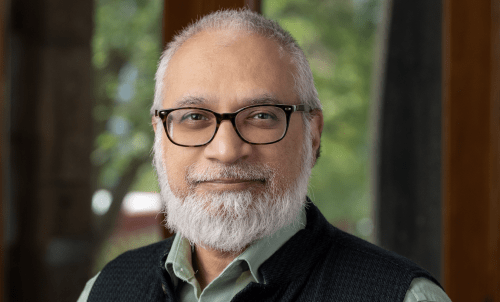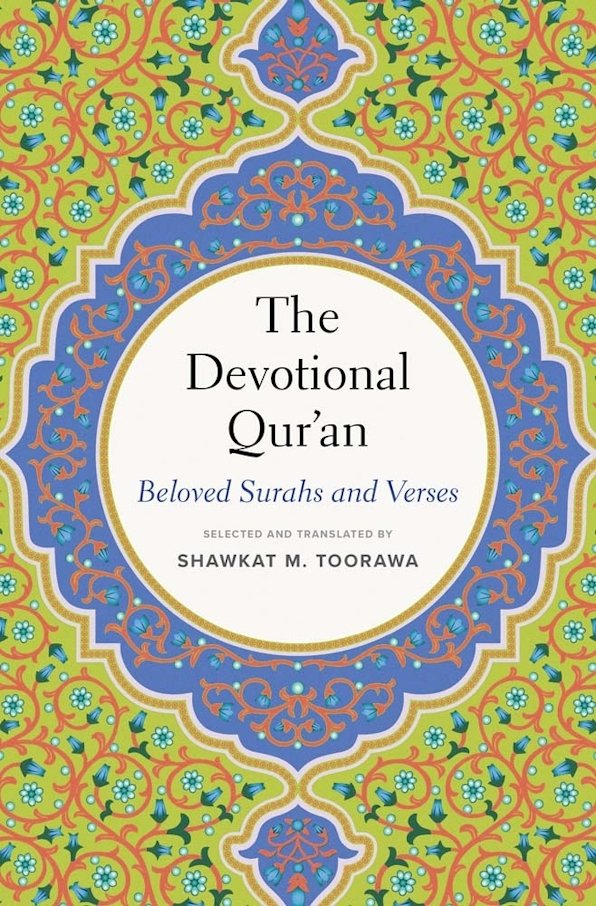Lucid and Lyrical: A New Translation of a Sacred Text
FAS Professor Shawkat M. Toorawa’s new book is a curated English translation of Qur’anic verses that evokes the literary qualities of the original Arabic in fresh, living, lyrical prose.

Shawkat M. Toorawa, Brand Blanshard Professor of Near Eastern Languages and Civilizations and Professor of Comparative Literature in the Faculty of Arts and Sciences—and a world-renowned expert on the Qur’an, translation, and Arabic literature—has written a new book, The Devotional Qur’an: Beloved Surahs and Verses (Yale University Press, 2024), to address an ongoing concern he had about English translations of the Qur'an.
In the past, Toorawa said, it had not been “possible for me to say, ‘read this one,’ although I do have a ranking of them in my mind.”
The problem, he explained, is that the available English translations of the Qur’an were lacking something.
The meaning was often lost behind stilted, old-fashioned English, awkwardly arranged verse, or forced rhyme. All too often, integral context was left unexplained and therefore incomprehensible to non-specialists. “When my daughters would read a translation and ask what something meant, I would give them my own translation, that I would still have to explain,” he noted.
Somehow, too, the sonic power and beauty of the original Arabic were usually lost in translation. Few translators made the consistent and intentional effort to convey the Qur’an’s “acoustic and rhythmic qualities,” said Toorawa. The passages of the Qur’an selected for inclusion in the Norton Anthology of World Literature or the Longman Anthology of World Literature lacked these qualities, Toorawa added, possibly leading readers to wonder why such an inelegant work had been included in those anthologies to begin with.
“The inclusion of the Qur’an will definitely have been because it's an important text – and maybe that alone is a good reason to include something – but I was unhappy as a lover of literature and as someone who teaches from those texts because Qur’an translations weren’t being held to the same standard as other texts,” Toorawa said. “You read the Iliad translation, and it reads well; you read Egyptian love songs and they sound good; you read Gilgamesh, and it may not speak to you, but you can be taught to recognize the quality, the literariness, and the literary value, and I felt strongly that there isn't enough of the Qur’an in English that at least tries to do that.”
So, initially without a larger project in mind, Toorawa began translating surahs—the chapters, which are divided into verses, that make up the Qur'an—aiming to craft versions that were literary as well as deeply meaningful. When he decided to bring these together in a book, he consulted with Peter Cole, who is Senior Lecturer in Jewish Studies in the FAS and a gifted poet and translator.
“I knew I couldn’t put these out in the world unless the Peter Coles of the world thought they were at least adequate. If the Qur’an is world literature, I want there to be examples of it that demonstrate its literary and aesthetic qualities.”
Toorawa spoke with Natalie DeVaull-Robichaud of the FAS Dean’s Office about how he achieved the aim to bring faith and poetry together in a new collection.
How did translating surahs lead to a book, and what was that process like?

Toorawa: When I started translating surahs, and those translations appeared in the Journal of Qur’anic Studies, the feedback from colleagues was super positive, and I was very happy that I was filling a gap. Inevitably, I translated more and more of them, and people would say, “Well, are you going to do the whole Qur’an, are you going to put together a book?” And I would answer, “I have no intention to translate the whole Qur’an.” I've never had that intention. I still have no interest in doing that.
But as I talked to colleagues and dear friends, I thought, maybe I should think about pulling my translations together so that they’re all in one place. So I started talking about something I initially called The Liturgical Qur’an. I thought maybe I should organize it around the surahs that people use regularly in their devotions, and when I went back and looked at the ones I'd translated, I realized that, unconsciously, I’d been translating the very surahs that Muslims use on a regular basis in daily prayers. And I thought that would be a sensible way to delimit the book.
Not surprisingly, the material from the Qur’an that matters to modern scholars – Muslim and non-Muslim – relates to comparative religion, interfaith dialogue, or seems to have late antique resonances. But the material that matters to Muslims are the passages and verses that they use devotionally. One of my aims was to put out a collection in which the material from the Qur’an is not what Qur’anic Studies scholars typically pay attention to. I thought that would make for an illuminating kind of intervention.
Reviews of The Devotional Qur’an praise your attention to the poetic and sonic qualities of your translations. Can you talk about your writing process and how you brought these qualities to your prose?
Toorawa: As I thought about ways one might convey surahs in English, I made the initial decision (and, some might say, mistake) to privilege rhyme, rhythm, and assonance.
As a poet, Peter [Cole] has insights I don't have – and one of the things he said to me was: “The proof that a rhyme works is when you don't notice it.” And, of course, my rhymes in my early translations were very noticeable. I was very committed to end rhyme in the early iterations, and I was letting that drive my choices.
I did not think I was doing a terribly good job, but I did think I was doing the right job. And so the idea with this book was to try and reduce the distance between my not having done a great job [with those earlier versions] and trying to do a better job with things like rhyme, sound, and rhythm.
English cannot do what the Arabic does, and I don't believe that one should necessarily do what the Arabic does. I believe that's what's been holding Qur’an translation back. [Translators] feel they have to be faithful to the syntax and word choices, but those are entirely conditioned by the fact that it's seventh century Arabic. If you try to replicate that in English, you end up with a very wooden text.
In fact, that's the word I would use to describe my early translations—they were wooden, but it was also clear to me that there was a way to chip away at the dross and let some of what was underneath shine through, and I think that that's my feeling about the book generally. In the places where I succeeded, I succeeded, and in the places where I didn't succeed, my hope is that others will realize, especially readers who are attentive, that there was an attempt to do something right there – to try and capture an aspect of the sound. Of course, if one doesn't know the Qur’an in Arabic, one has to rely entirely on English. The Arabist I think recognizes this, and my colleagues in the Arabic Studies community have been very happy with it.
As you speak about sound, it reminds me of that moment in your introduction when you mention reading a neo–Victorian English translation of the Qur’an as a child and thinking this is what God would sound like. How does the translated language of sacred texts affect our experience and our sense of God’s voice?
Toorawa: A lot of the Muslims I know who are Anglophone have somehow clearly accepted that God does not need to “sound like” God in English because when you read the translations that are out there, they're really quite dorky, wooden, wrong, or literally incomprehensible. Using “thou” and “thy” doesn't suddenly make it God-sounding. It’s completely bereft of urgency and emotion. Translators might want to make the English of the Qur’an sound like the King James Bible because we've been attuned to that as how God sounds; it seems highly unlikely that Christ or God would go around speaking that way, right?
I am no longer a young boy and I know that God’s voice isn't Victorian. I have tried to capture a different voice. To paraphrase Peter Cole: “It’s got to sound like revelation, whether you believe it's revelation or not.”
It was important to me that I try to do that, and that was hard, because the Qur’an is many different genres: There are passages that are gentle and passages that are harsh. There's sermonizing and there's narrative. How, then, to capture a voice that sounded like it had authority – an authority behind it which the text itself insists is an all-compassionate, ever-forgiving God, even though he may mete out punishment? For me, what was helpful was thinking about a parent, without meaning to infantilize followers, because that's how I would describe the God of the Qur’an.
I recently gave a talk about the book at the University of London, and it was community-facing. Most of the audience was Muslim, and I would say roughly half of them were enchanted by the book. But one person said to me, “Don't you think that by not doing a literal translation you’re sacrificing meaning?”
And I said, “What I want to emphasize is that for me, to translate it literally, is to sacrifice meaning: Arabic works one way and English works another. And so, to take that to its logical end, you would have to translate it word for word, a literal word for word translation, because only then would you be ‘faithful,’ but for me fidelity rests in a kind of total meaning.”
What do you hope readers discover in your curated translation?
Toorawa: I hope that readers, whether they're familiar with the Qur’an or not, will discover, in spite of the fact that it's a quite a polemical text, that parts of it – and maybe even most of it – are quite beautiful.
Shawkat M. Toorawa is Brand Blanshard Professor of Near Eastern Languages and Civilizations and Professor of Comparative Literature in the FAS. His new book, The Devotional Qur’an: Beloved Surahs and Verses, is available from Yale University Press.
The FAS Dean's Office announces new books to the FAS community and beyond. FAS faculty can inform us of their book’s publication through this webform.